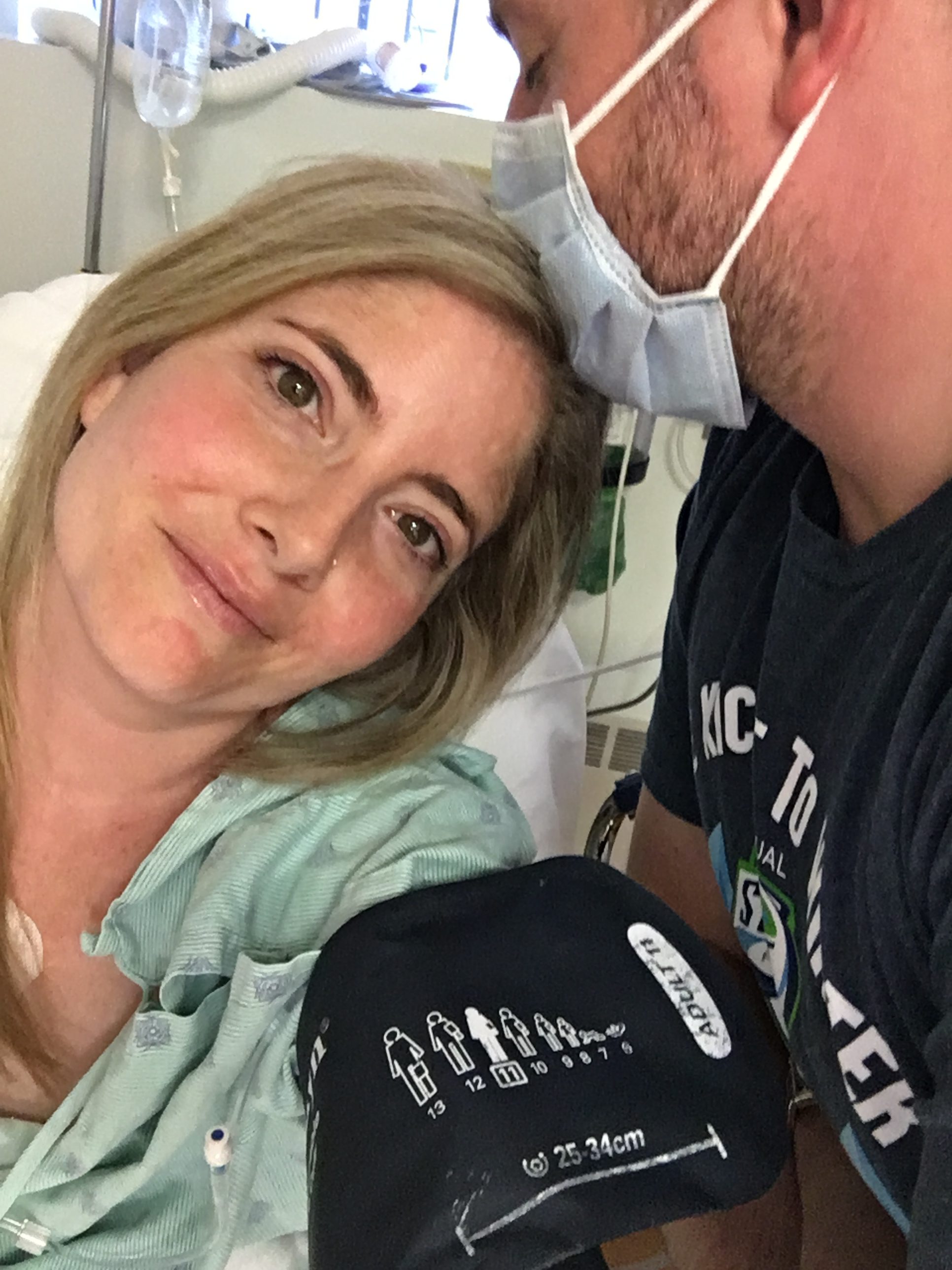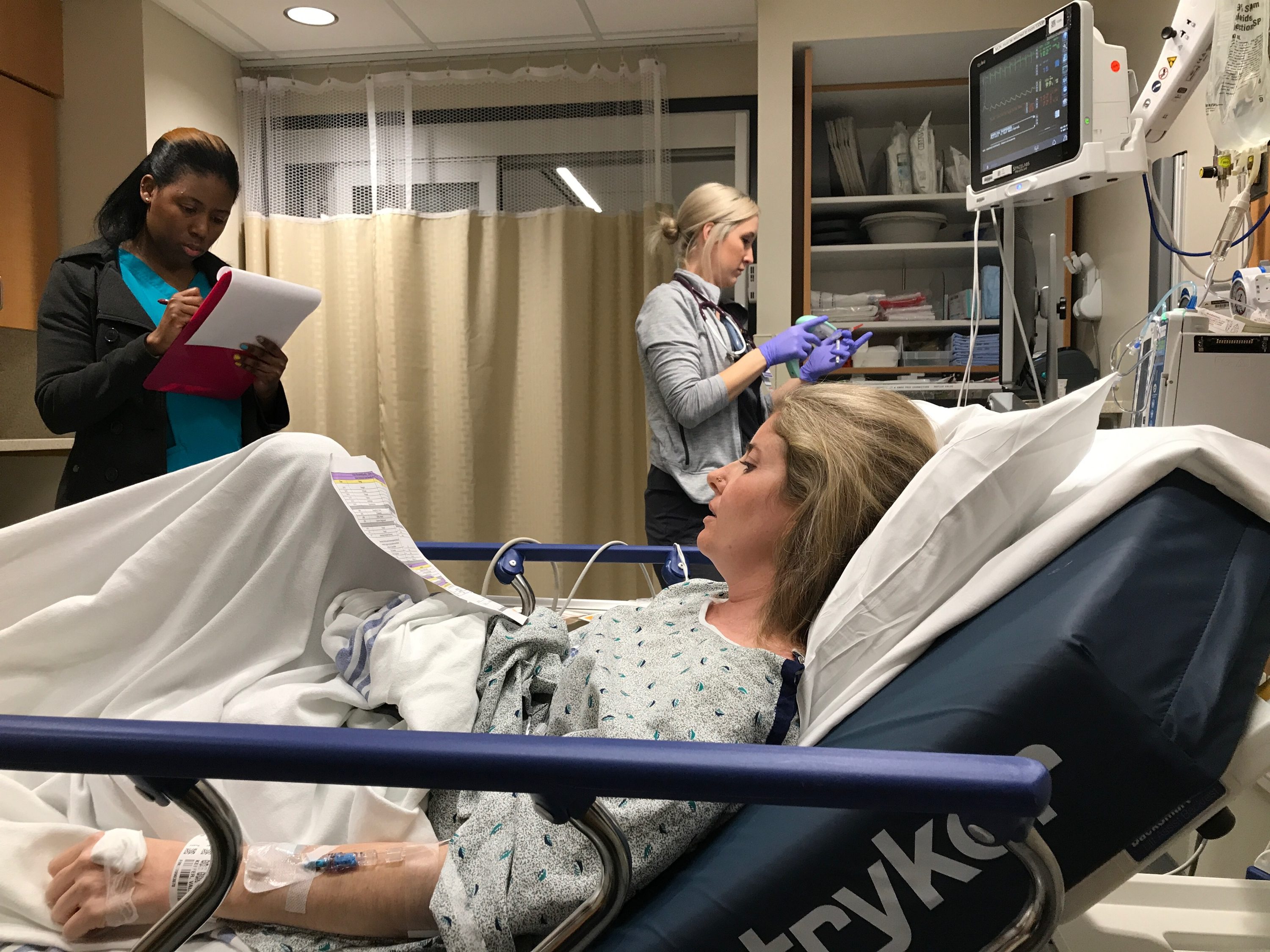
Valen receiving support from her husband, Noah, after waking up from a recent procedure.
Being a patient takes work and dedication. Depending on our health status, it can feel like a part-time to full-time job. It is a constant learning process and important to find a balance between our health challenges and everything else in life. We don’t want to get consumed by our appointments, our medical tasks and how we feel, but rather try to lead the best quality of life despite what we are going through. I’ve been a patient since I was a child and over the years, I’ve gained a lot of knowledge on how to cope with health issues and be a great patient advocate for myself and others. Here are a few tips that have helped me along the way:
1) Be an active participant in your health. Make sure you know all of the medicines you take and why you take them. It’s best to carry a list of all of your meds with you. When in the hospital, pay attention to what nurses or doctors are doing and/or giving you and why. Stay organized, as you have a lot to keep track of with medicine, doctor appointments, health information, medical bills, etc. Be empowered by learning all you can about your disease and taking an active role in your health.

Valen reviewing her medical reference spreadsheet with a nurse.
2) Speak up. Trust your gut – you know your body and health best. If you aren’t feeling well, speak up and share with your doctors what is going on. I recently had to speak up following a procedure. I was admitted to the hospital and was already overdue for my afternoon transplant meds. It was going to be hours until I’d receive them from the hospital pharmacy, so I told the nurse that I had my own meds and was going to take them. After voicing my opinion and the importance of me taking my meds on time, I got the approval from the charge nurse. Remember that you are in control of your health.
3) It is ok to ask for help. This can be a challenge when we go from being completely healthy to sick and your sense of normality changes. Our loved ones want to help, so don’t be afraid to ask for it. Having someone go to appointments with you is of great value, too. Welcome support because it is helpful and feels good to have someone with you.

Valen enjoying being out in nature, her happy spot.
4) Be kind to yourself. We go through so much mentally and physically. Try not to be too hard on yourself and take time to relax and do something enjoyable in the midst of everything.
5) Get involved. Meet others who are going through the same thing as you. Knowing you are not alone is invaluable. It is also rewarding to share your story and knowledge to help others along their journey. It helps give purpose to all you are enduring. Did you know the PKD Foundation has local PKD Chapters that offer guidance and support? Get connected with your local Chapter!
These are just a few tips that help empower me to be the best patient and lead a positive journey as a PKD patient. I hope they help empower you, too.
What are some of your tips on being a great patient advocate?









You are amazing! Your message to folks with PKD is inspirational and valuable.
Thank you so very much, Adrian! This means a lot and helps to fuel my passion of sharing my story and encourages me to keep writing. Grateful for your support and thanks so much for reading my blog and sharing your sweet sentiments.
Wow thanks Valen, you voiced my medical journey with PKD perfectly! Insisting on taking my own meds on my timeline is something I’ve had to do several times in an ER situation.
I am so appreciative of my support folks but I fear wearing them out with the multiple appts. that I need someone to drive me home from.
I agree with your suggestion to take notes of each person that enters your room-sometimes it’s hard to tell what their job is. It’s also helpful when you are filling out surveys the hospital sends you a few weeks after your visit.
Take good care, there are lots of us wishing you a year filled with healing.
Hi Jill,
I’m glad you could connect with this blog.
Thank you for sharing your sentiments in connection to this topic. I feel the same way about the support aspect. Good point that keeping track of people in the hospital is then useful when filling out surveys.
I greatly appreciate your healing wishes.
Hugs!
Hello Jill,
Thank you for your insight when it comes to our health with PKD. My “tip” is to keep a 3-ring binder in which you can take to doctor visits and hospital stays. I write down which arm is best to find a vein to draw blood, X-rays/MRIs/CT scans and important business cards as well as notes where the best coffee can be located by each doctor’s office. We all think that we will remember information but a simple binder helps when we are feeling bad or in a rush.
CB
Hi Christi,
Thank you very much for sharing your awesome tip. Appointments can be overwhelming and it’s really helpful to go in prepared and with all of your information at your fingertips, versus relying on remembering everything. Great tip! Thanks!
Find a doctor, nurse or patient navigator who can talk you through medical jar 6688 gon. You can t advocate for yourself if you don t understand the medical information that s being given to you. Speak up if you can t make sense of test results or need more information about your condition or treatment.